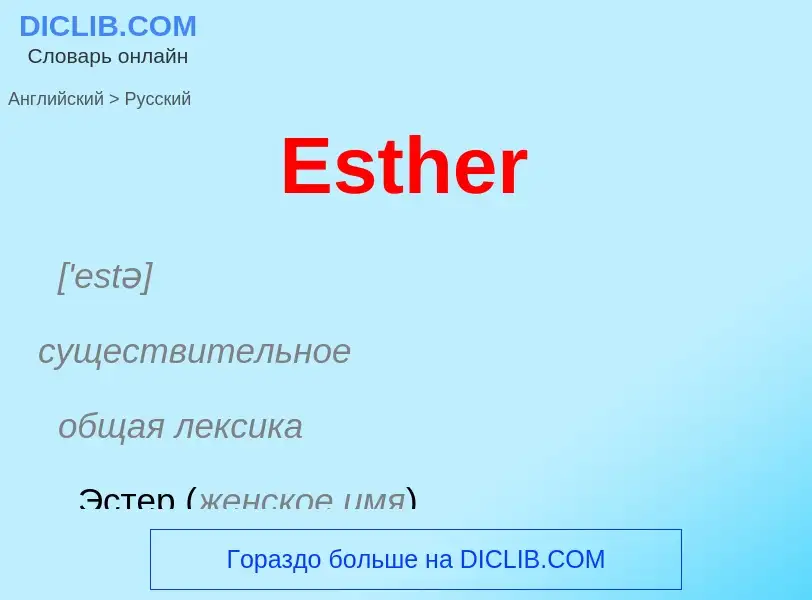Traducción y análisis de palabras por inteligencia artificial ChatGPT
En esta página puede obtener un análisis detallado de una palabra o frase, producido utilizando la mejor tecnología de inteligencia artificial hasta la fecha:
- cómo se usa la palabra
- frecuencia de uso
- se utiliza con más frecuencia en el habla oral o escrita
- opciones de traducción
- ejemplos de uso (varias frases con traducción)
- etimología
Esther - traducción al ruso
['estə]
существительное
общая лексика
Эстер (женское имя)
Эстер
библейское выражение
Эсфирь
Книга Эсфири
['esi]
существительное
общая лексика
Эсси (женское имя)
уменьшительная форма
of Esther Эсси
Смотрите также
Wikipedia

Esther is the eponymous heroine of the Book of Esther. Set in the Persian Achaemenid Empire, it tells how king Ahasuerus seeks a new wife after his queen, Vashti, is deposed for disobeying him. Esther (called Hadassah when first introduced) is chosen to fulfill this role due to her beauty. Ahasuerus' grand vizier, Haman, is offended by Esther's cousin and guardian, Mordecai, due to his refusal to prostrate himself before Haman. Consequently, Haman plots to have all the Jewish subjects of Persia killed, and convinces Ahasuerus to permit him to do so. However, Esther foils the plan by revealing Haman's eradication plans to Ahasuerus, who then has Haman executed and grants permission to the Jews to kill their enemies instead, as royal edicts (including the order for eradication issued by Haman) cannot be revoked under Persian law.
Her story provides the traditional explanation for the Jewish holiday of Purim, celebrated on the date given in the story for when Haman's order was to go into effect, which is the day that the Jews killed their enemies after the plan was reversed. The book exists in two distinct forms: a shorter Hebrew version found in Jewish and Protestant Bibles, and a longer Greek version found in Catholic and Orthodox Bibles.


 - Aert de GELDER - Google Cultural Institute.jpg?width=200)
![''Esther Denouncing Haman'' (1888) by [[Ernest Normand]] ''Esther Denouncing Haman'' (1888) by [[Ernest Normand]]](https://commons.wikimedia.org/wiki/Special:FilePath/Esther Denouncing Haman.jpg?width=200)
![Johannes Spilberg the Younger]], c.1644 Johannes Spilberg the Younger]], c.1644](https://commons.wikimedia.org/wiki/Special:FilePath/The Feast of Esther by Johannes Spilberg the Younger.jpg?width=200)
![The Shrine venerated as the [[Tomb of Esther and Mordechai]] in [[Hamadan]], [[Iran]] The Shrine venerated as the [[Tomb of Esther and Mordechai]] in [[Hamadan]], [[Iran]]](https://commons.wikimedia.org/wiki/Special:FilePath/Tomb of Esther and Mordechai exterior.jpg?width=200)

